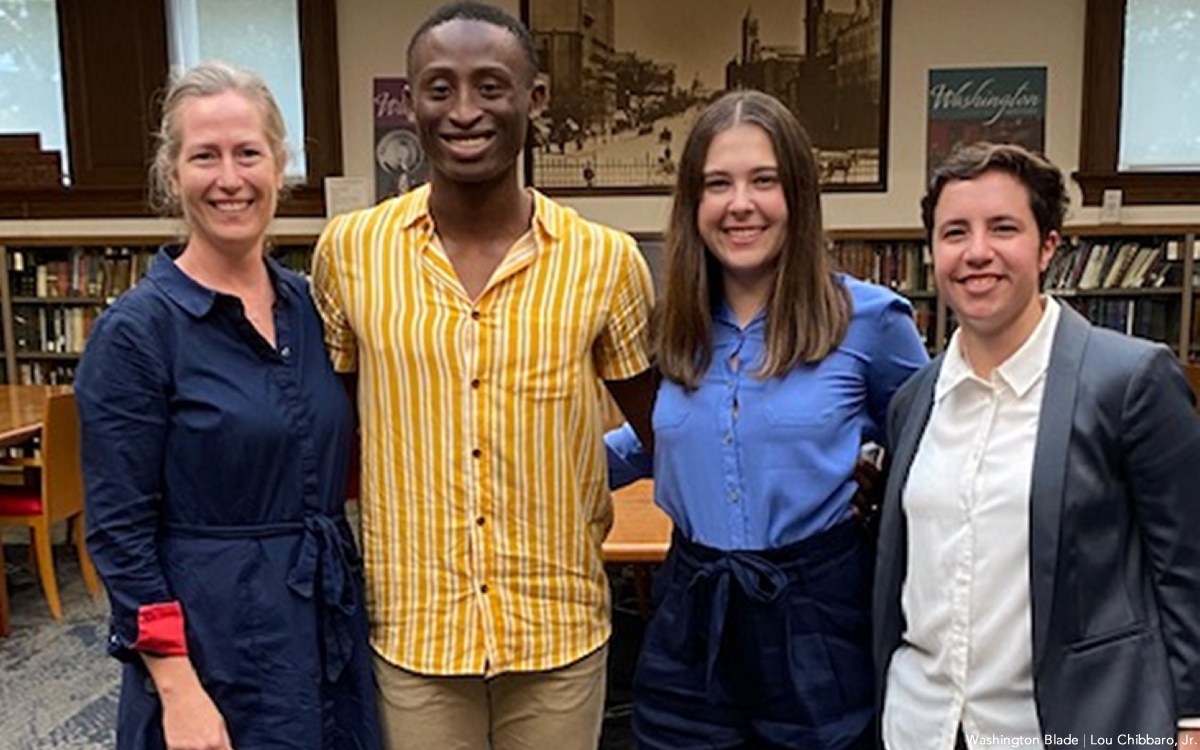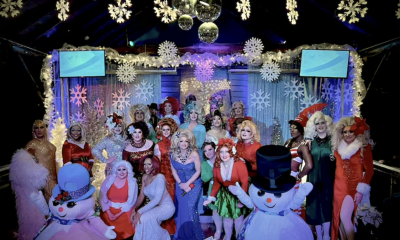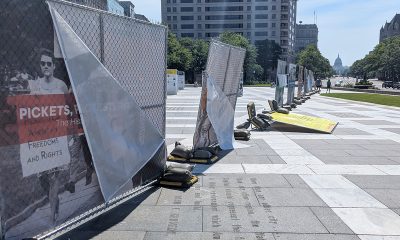District of Columbia
Naval Academy midshipmen serve as Rainbow History Project interns
D.C. group says support symbolizes evolution of LGBTQ community

Vincent Slatt, director of archiving of D.C.’s Rainbow History Project, says he and other members of the group’s board were pleasantly surprised in 2017 when a professor at the U.S. Naval Academy in Annapolis, Md., invited members of the group to speak to a class she taught on LGBTQ studies.
Slatt told the Washington Blade the presentation that he and other Rainbow History Project members gave went very well, and the group’s interaction with the professor and the academy led to what he believes was an important step in the D.C. LGBTQ history group’s evolution.
In May of this year, three Naval Academy midshipmen became student interns for the Rainbow History Project as part of a four-week program to process and organize several dozen boxes of documents donated by the D.C. LGBTQ youth advocacy group SMYAL. According to Slatt, the midshipmen did an excellent job of organizing the SMYAL documents by putting them in folders and new professional archival standard boxes.
“And they created what’s called a finding aid to describe the collection,” Slatt said, noting that a finding aid is used by researchers who access Rainbow History Project’s collections in the way that people use a table of contents or an index to navigate a book.
In addition to working on the SMYAL documents, the Naval Academy interns – Midshipmen Brahmir Vick, Caroline Bilbray-Kohn, and Hannah Nunes – also conducted what Slatt says is another crucial component of Rainbow History Project’s mission. They transcribed more than 25 audio recordings of oral history interviews of LGBTQ people from the D.C. metro area that make up another important part of Rainbow History Project’s collections.
The three midshipmen in June completed their second year at the Naval Academy’s four-year studies program from which they will graduate in 2024 as commissioned officers with a bachelor of science degree.
Each of them gave a presentation on the specific work they did as Rainbow History Project interns at a June 23 event hosted by the DC History Center located in the city’s historic Carnegie Library building at 801 K St., N.W.
Slatt points out that in yet another important part of Rainbow History Project’s evolution since its founding in 2000, it entered a partnership with the DC History Center in 2008 in which the Center serves as a repository and physical host for the Rainbow History Project’s entire archival collection.
Among other things, the collection includes documents and papers from LGBTQ organizations and activists as well as individual LGBTQ people who played some role in the evolution of the D.C. LGBTQ community. The collection, details of which can be accessed on the Rainbow History Project’s website, also includes digitized audio recordings of the oral history interviews of LGBTQ people from the D.C. area.
The DC History Center, which was founded in 1894, describes itself on its website as a community-supported nonprofit organization that “collects, interprets, and shares the history of the nation’s capital through research and scholarship, adult programs, youth education, and exhibits.”
In an announcement on its website, the DC History Center called the June 23 event featuring the three Naval Academy students an important part of its work.
“For the second year in a row, DC History Center hosts students from the US Naval Academy for a crash course in DC LGBTQ+ history and archives, featuring the Rainbow History Project collections,” the website message says.
The DC History Center has become the “perfect group” to store and provide access for researchers and the public to Rainbow History Project’s archival collection “because they’re dedicated to local Washington, D.C. history,” Slatt told the Blade. “And we want all of our gay history to be part of Washington local history,” he said.
Anne McDonough, deputy director of the DC History Center, told those attending the June 23 event that the Center has had an excellent working relationship with Rainbow History Project, which has helped the public and researchers gain access to the archival records of local LGBTQ history.
During their presentation at the June 23 event, the three midshipmen presented photographic slides of some of the LGBTQ people whose oral history interviews they transcribed. The three said they each obtained an important understanding and knowledge of the D.C.-area’s LGBTQ history from listening to the oral history interviews.
The Rainbow History Project’s archives can be accessed at rainbowhistory.org.
District of Columbia
Gay ANC member announces candidacy for Ward 1 D.C. Council seat
Community leader Brian Footer seeking seat held by Brianne Nadeau

Gay Advisory Neighborhood Commissioner Brian Footer, a community activist who has been involved for many years in local and national government affairs, has announced his candidacy for the Ward 1 D.C. Council seat up for election in 2026.
Footer, a Democrat, will be running in the city’s June 2, 2026, Democratic primary for the Ward 1 Council seat, but it is uncertain whether he will be running against incumbent Ward 1 Council member Brianne Nadeau (D). Nadeau has not yet announced if she plans to run for re-election for a fourth term following her 12 years on the Council.
Nadeau has been a longtime vocal supporter of the LGBTQ community.
If Footer were to win the primary and the November 2026 general election, he would become the Council’s second openly gay member. Ward 5 Council member Zachary Parker (D) is currently the 13-member Council’s only gay member.
Footer is a three-term ANC commissioner who currently serves as Chair of ANC 1E, which represents the city’s Adams Morgan neighborhood.
“Brian has worked at every level of government — federal, state, and local — building a career rooted in public service, aging policy, and inclusive urban planning,” a statement on his campaign website says.
“I’m running for Council because too many people in Ward 1 are doing everything right and still feel ignored by the city they call home,” Footer states on his website.
“I’m running because we can do better,” his statement continues. “That means making housing more affordable, addressing homelessness with real solutions, and keeping our neighborhoods safe with smart, community focused strategies.”
When contacted by the Washington Blade for comment, Nadeau said she was not ready at this time to discuss her plans about running again or about Footer’s candidacy.
“The primary is a ways away, and I’m very focused right now on the budget and the stadium deal and all the work that we’re doing at the Council,” she told the Blade. “So, I really haven’t had time to turn to my plans. So, as a result, I’m also not going to be commenting on anybody else who is determined that they’re running at this time.”
She first won election to the Council in 2014 after she defeated four-term gay Ward 1 Council member Jim Graham in the Democratic primary after Graham became embroiled in an ethics controversy.
In the 2022 Democratic primary Nadeau defeated gay challenger Salah Czapary in a three-candidate race, by a margin of 48.5% of the vote compared to Czapary’s 30.9%.
With the third candidate, Sabel Harris, receiving 20.4%, the outcome showed that the two challengers had a combined total vote count higher than Nadeau.
Further details of Footer’s candidacy can be accessed from his campaign website, brianfooterdc.com.
District of Columbia
Gay GOP group hosts Ernst, 3 House members — all of whom oppose Equality Act
Log Cabin, congressional guest speakers mum on June 25 event

U.S. Sen. Joni Ernst (R-Iowa) and three women Republican members of the U.S. House appeared as guest speakers at the June 25 meeting of Log Cabin Republicans of D.C., the local chapter of the national LGBTQ Republican group with that same name.
The U.S. House members who joined Ernst as guest speakers at the Log Cabin meeting were Celeste Maloy (R-Utah), Kat Cammack (R-Fla.), and Julia Letlow (R-La.).
Neither D.C. Log Cabin Republicans President Andrew Minik nor spokespersons for Ernst or the three congresswomen immediately responded to a request by the Washington Blade for comment on the GOP lawmakers’ appearance at an LGBTQ GOP group’s meeting.
“Please join us for an inspiring evening as we celebrate and recognize the bold leadership and accomplishments of Republican women in Congress,” a D.C Log Cabin announcement sent to its members states.
“This month’s meeting will highlight the efforts of the Republican Women’s Caucus and explore key issues such as the Protection of Women and Girls In Sports Act and the broader fight to preserve women’s spaces in society,” the message says.
It was referring to legislation pending in Congress calling for banning transgender women from participating in women’s sports events.
According to media reports, Ernst and the three congresswomen have expressed opposition to the Equality Act, the longstanding bill pending in Congress calling for prohibiting discrimination based on sexual orientation and gender identity in the areas of employment, housing, and public accommodations.
The Log Cabin announcement says the meeting was scheduled to take place at the Royal Sands Social Club, which is a restaurant and bar at 26 N St., S.E. in the city’s Navy Yard area.
D.C. Log Cabin member Stuart West, who attended the meeting, confirmed that Ernst and the three congresswomen showed up and spoke at the event.
“It was a good turnout,” he said. “I would definitely say probably 30 or 40 people attended.” West added, “Four women came to talk to a group of mostly gay men. That’s something you don’t see very often.”
District of Columbia
D.C. police seek public’s help in July 5 murder of trans woman
Relative disputes initial decision not to list case as hate crime

D.C. police are seeking help from the public in their investigation into the murder of a transgender woman who they say was shot to death at about 12:30 a.m. on Saturday, July 5, on the 2000 block of Benning Road, N.E.
But the police announcement of the fatal shooting and a police report obtained by the Washington Blade do not identify the victim, 28-year-old Daquane ‘Dream’ Johnson of Northeast D.C., as transgender. And the police report says the shooting is not currently listed as a suspected hate crime.
It was local transgender activists and one of Johnson’s family members, her aunt, who confirmed she was transgender and said information they obtained indicates the killing could have been a hate crime.
“On Saturday, July 5, at approximately 12:51 a.m., Sixth District officers were flagged down in the 2000 block of Benning Road, Northeast, for an unconscious female,” a July 5 D.C. police statement says. “Upon arrival, officers located an adult female victim suffering from gunshot wounds,” it says.
“D.C. Fire and EMS responded to the scene and transported the victim to a local hospital where after all lifesaving efforts failed and the victim was pronounced dead,” the statement says.
A separate police flyer with a photo of Johnson announces an award of $25,000 was being offered for information leading to the arrest and conviction of the person or persons responsible for the murder.
The flyer identifies D.C. police Homicide Detective Natasha Kennedy as being the lead investigator in the case and says anyone with information about the case should contact her at 202-380-6198.
Longtime D.C. transgender rights advocate Earline Budd told the Blade that one of the police investigators contacted her about the case and that she also spoke to Detective Kennedy. Budd said police confirmed to her that Johnson was a transgender woman.

One of Johnson’s family members, Vanna Terrell, who identified herself as Johnson’s aunt, told the Blade that Johnson used the first name of Dream and had planned to legally adopt that name instead of Daquane but had not gotten around to doing so.
Terrell said she and other family members learned more about the incident when one of two teenage high school students who knew Johnson’s brother contacted a friend and told the friend that they recognized Johnson as they witnessed the shooting. Terrell said the friend then called her to tell her what the friend learned from the two witnesses.
According to Terrell, the witnesses reportedly saw three men approach Johnson as Johnson walked along Benning Road and one of them called Johnson a derogatory name, leading Terrell to believe the men recognized Johnson as a transgender woman.
Terrell said one of the witnesses told the friend, who spoke to Terrell, that the man who shot Johnson kept shooting her until all of the bullets were fired. Budd, who said she spoke to Terrell, who also told her what the witnesses reported, said she believed the multiple shots fired by the shooter was an “overkill” that appears to have been a hate crime. Terrell said she too believes the murder was a hate crime.
In response to an inquiry from the Blade, Officer Ebony Major, a D.C. police spokesperson, stated in an email, “At this point there is nothing in the investigation that indicates the offense was motivated by hate or bias.”
Terrell said a memorial gathering to honor Johnson’s life was scheduled to be held Saturday, July 12, at River Terrace Park, which is located at 500 36th St., N.E. not far from where the shooting occurred.

-

 Federal Government2 days ago
Federal Government2 days agoTreasury Department has a gay secretary but LGBTQ staff are under siege
-

 Virginia3 days ago
Virginia3 days agoDefying trends, new LGBTQ center opens in rural Winchester, Va.
-

 District of Columbia2 days ago
District of Columbia2 days agoGay GOP group hosts Ernst, 3 House members — all of whom oppose Equality Act
-

 Opinions4 days ago
Opinions4 days agoUSAID’s demise: America’s global betrayal of trust with LGBTQ people












